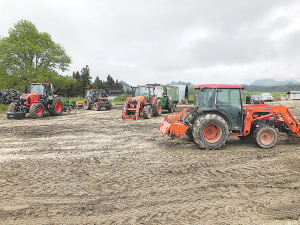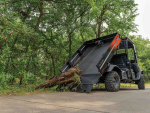Alastair Neville is a third-generation dairy farmer, at Reporoa in the central North Island, running the family’s 320-cow operation.
Over the past five years, Neville has transitioned from a traditional spring calving to a 100% autumn high input system.
Like any high-output system, a range of tractors and machinery is required, but for the last 40 years, since their first purchase in 1982, the Nevilles have relied on Kubota for tractors, owning 13 different examples over that time. Currently the operation uses four Kubota tractors, including a 2004 M110, 2006 L5030, 2013 M126GX and a 2021 M7152.
Neville says the business needs reliable machines that pull their weight, to avoid any production related interruptions.
“Despite the increased demands placed on us by the switch to autumn calving, our Kubota tractors have always kept up,” he says.
A high input system requires different machines and tractors to be running daily at different times of the year. Between February and September, a mixer wagon pulled by the Kubota M7152 plays a key role in producing a mixed ration for the feed pad.
Neville says that Kubota tractors have enabled him to run bigger, more efficient equipment on the farm and allowed him to take on larger projects.
“As well as being able to take on larger jobs such as cultivation, general farm work and harvesting, our Kubota tractors have been nimble and compact too, with the ability to get into tighter spaces,” he says.
Of particular interest, Neville feels confident that whoever works on the farm will feel comfortable from the moment they are in the cab, with clear key operating controls, a logical layout and easily accessible service points, making them user friendly and safe.
“Kubota machines stand out because they are simple and reliable. There aren’t any fancy tricks with our tractors, they’re simple to start, easy to put it into gear and just get on with the work,” Neville said.
Having recently been through the exercise of buying an extra machine for the operation, the Nevilles looked at four other competing tractor brands.
“Knowing how reliable Kubota machines are, with excellent components and build quality, it was really a no brainer to choose Kubota again.
“We have continually purchased Kubota tractors because of excellent service and back up, so mixed with quality of construction, comfort and evolving technology, they really stand apart and get the jobs done efficiently, without costing you a bomb.”


















